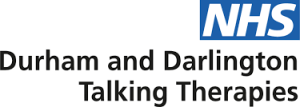NHS Durham and Darlington Talking Therapies
More About Us
Durham and Darlington Talking Therapies is a service which runs as a partnership between Sunderland Counselling Service, Mental Health Matters and Tees, Esk and Wear Valleys NHS Foundation Trust.
What do we offer?
Sunderland Counselling Service are proud to offer the following types of talking therapies at Durham and Darlington Talking Therapies:
Step One Counselling
Step one counselling is helpful to support your wellbeing.
Step one counselling is usually offered up to 6 sessions, one to one with a counsellor.
Counsellors will build a supportive and non-judgmental relationship with you based on empathy and honesty. Your counsellor will provide a safe environment for you to:
- Explore what is bothering you
- Support you to feel better
- Raise awareness of your emotions
- Make sense of your circumstances and experiences.
Step one counselling can be helpful for individuals experiencing mild feelings of:
- Low Mood
- Relationship issues
- Bereavement, Grief and Loss
- Work problems
- Adjusting to significant life events and changes
- Self-esteem issues
- Loss of confidence
Person Centred-Experiential Counselling for Depression
Person Centre-Experiential Counselling for Depression (PCE-CfD) is a high intensity intervention that can be offered up to 7 sessions or up to 20 sessions, depending on the service.
Sunderland Counselling Service are a leading local provider of PCE-CfD Counselling and Supervision.
Counsellors will build a supportive, non-judgmental and in-depth relationship with you based on empathy and honesty.
Together with your counsellor, you will establish and work towards a therapeutic aim. Through exploration of your experiences and emotions, your counsellor will support you to:
- Access and express underlying feelings and make sense of them
- Find new meanings to make positive changes in your life.
- Reduce your negative thoughts and feelings
- Feel better about yourself and your life
- Find ways to achieve a greater degree of choice and purpose in the world
- Develop emotional awareness
- Gain greater understanding of yourself, your relationships and your responses to others
- Find different ways to manage your feelings
- Explore childhood experiences and feelings and how they related to present day situations
PCE-CfD is suitable for:
- People who can explain what is bothering them
- People who may have tried other support first
- People whose problems have continued for a longer time
- People who can be reflective between counselling sessions
- People who want to explore feelings and emotions
PCE-CfD can be helpful for individuals experiencing mild and moderate feelings of:
- Depression or low mood
- Relationship issues
- Bereavement, Grief and Loss
- Complicated or long-lasting feelings of grief
- Work problems
- Adjusting to significant Life events and Changes
- Self-esteem issues
- Loss of confidence
- Anger
- Issues around maintaining attachments and relationships
EMDR
Eye Movement Desensitization and Reprocessing (EMDR) is a therapeutic intervention for people who have experienced trauma.
EMDR is designed to allow traumatic or distressing memories or experiences to be processed so they are no longer distressing. It is founded on a model of neuroscience that explains the way that processing of traumatic memories and experiences happens during sleep.
EMDR replicates the REM sleep process whilst awake to harness all of the brain’s resources to process trauma so that the memories can become less and less disturbing.
Your EMDR therapist will work with you using 8 protoclols which include preparation, processing, and evaluation stages. In treatment, you will be awake and aware, safe, and supported throughout.
EMDR is a high intensity Intervention that is offered in Talking Changes between 7 and 12 sessions.
EMDR is most suitable for:
- Trauma
- PTSD
- Symptoms that are the result of traumatic experiences such as
- Flashbacks
- Nightmares
- Intrusive memories
- Panic
- Sleep Disturbances
- Depression
- Anger
- Guilt
- Anxieties related to the threat response system such as:
- OCD
- Phobias
- Agoraphobia
EMDR would not be suitable for:
- Pregnant women
- People with heart disease
- Someone who is highly dissociative
- Anyone who is due to give evidence in court
A full and focused assessment will be offered to ensure this is the right treatment for you and to identify any barriers to treatment.
Who is this service for?
The service is available to anyone aged 16 or over that is living in County Durham or Darlington, with a common mental health problem.
How do I refer?
Online: You can contact Talking Changes online by going to their website and completing their self-referral form. All enquiries are in complete confidence. Durham and Darlington Talking Therapies website

GP Referral: You may wish to speak to your GP or a health professional for some more information. Following your discussion, they may refer you to Talking Changes.
Telephone: You can also contact Talking Changes directly by calling – 0191 3333300
Where is the service located?
We have locations across County Durham and Darlington. We work from GP surgeries, specialist hospitals and community settings. The areas we cover are:
- Seaham
- Darlington
- Consett
- Central Durham
- Chester-Le-Street
- Bishop Auckland
- Newton Aycliffe
- Spennymoor
What other support is available?
There are many other talking therapies available at Durham and Darlington Talking Therapies. These include:
- Guided Self Help
- Computerised CBT
- EMDR
- High Intensity CBT
- IPT
- Wellbeing and Support Groups
Please see our FAQ page for more information on these therapies.

